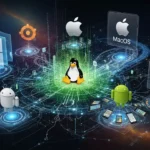Embarking on a journey into coding is an exciting and rewarding endeavor. Whether you aspire to become a professional programmer, create your software, or want to understand the language of computers, coding offers limitless possibilities. However, for beginners, learning to code can seem daunting.
Guide to Begin Your Coding Journey
This step-by-step guide will provide valuable tips and a roadmap to help you begin your coding journey with confidence and success.
Define Your Goals
Before diving into coding, take a moment to define your goals and objectives. Consider why you want to learn to code and what you hope to achieve. Are you interested in web development, mobile app development, data science, or simply acquiring a fundamental understanding of programming concepts? Defining your goals will guide your learning path.
Choose the Right Programming Language
Selecting the right programming language is crucial for beginners. Start with a beginner-friendly language such as Python, JavaScript, or Ruby. These languages are known for their readability and versatility, making them excellent choices for those new to coding. Python, in particular, is highly recommended for its simplicity and widespread use in various fields.
Find Quality Learning Resources
There is a wealth of learning resources available for aspiring coders. Explore online tutorials, coding courses, and textbooks. Websites like Codecademy, Coursera, edX, and freeCodeCamp offer structured courses in various programming languages. Consider investing in coding books or enrolling in a coding boot camp for a more comprehensive learning experience.
Start with the Basics
Begin your coding journey by mastering the fundamentals. Learn about variables, data types, loops, conditionals, and functions. Understanding these core concepts is essential for building a strong foundation in coding. Many online courses and tutorials focus on teaching these basics.
Practice Regularly
Coding is a skill that improves with practice. Dedicate time each day to coding exercises and projects. Websites like LeetCode, HackerRank, and Project Euler offer coding challenges that can allow you to hone your skills. Building small projects, even simple ones, is an excellent way to apply your learning.
Seek Guidance and Feedback
Don’t hesitate to seek guidance and feedback from experienced coders or online communities. Join coding forums, participate in coding meetups, and ask questions when encountering challenges. Platforms like Stack Overflow are invaluable for getting answers to specific coding questions.
Build Projects
Building projects is a pivotal step in your coding journey. Start with small projects and gradually work up to more complex ones. Projects provide practical experience and allow you to showcase your skills to potential employers or collaborators. Create a personal website, develop a simple mobile app, or automate a repetitive task with a script.
Collaborate and Contribute
Collaboration is a vital aspect of the coding community. Join open-source projects, contribute to GitHub repositories, or collaborate with fellow learners on coding projects. Working with others enhances your coding skills and exposes you to real-world development practices.
Stay Informed and Adapt
The world of coding is ever-evolving, with new languages, frameworks, and tools emerging regularly. Stay informed about industry trends and adapt to changes in technology. Consider taking advanced courses or specializing in a specific field of coding that aligns with your interests and career goals.
Be Patient and Persistent
Learning to code can be challenging, and you may encounter obstacles. Remember that it’s normal to face difficulties, and patience is key to overcoming them. Stay persistent, and don’t be discouraged by setbacks. Celebrate your achievements, no matter how small, and keep moving forward.
Conclusion
Beginning your coding journey is an exciting endeavor that opens doors to countless opportunities in the digital age. You can confidently embark on your coding adventure by following these step-by-step tips. Remember that the coding journey is a gradual process, and success comes with dedication, practice, and a willingness to adapt. Whether you’re aiming to become a professional developer or simply exploring the world of programming, your coding journey starts with that first step, and the possibilities are endless.





